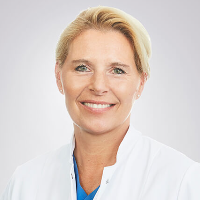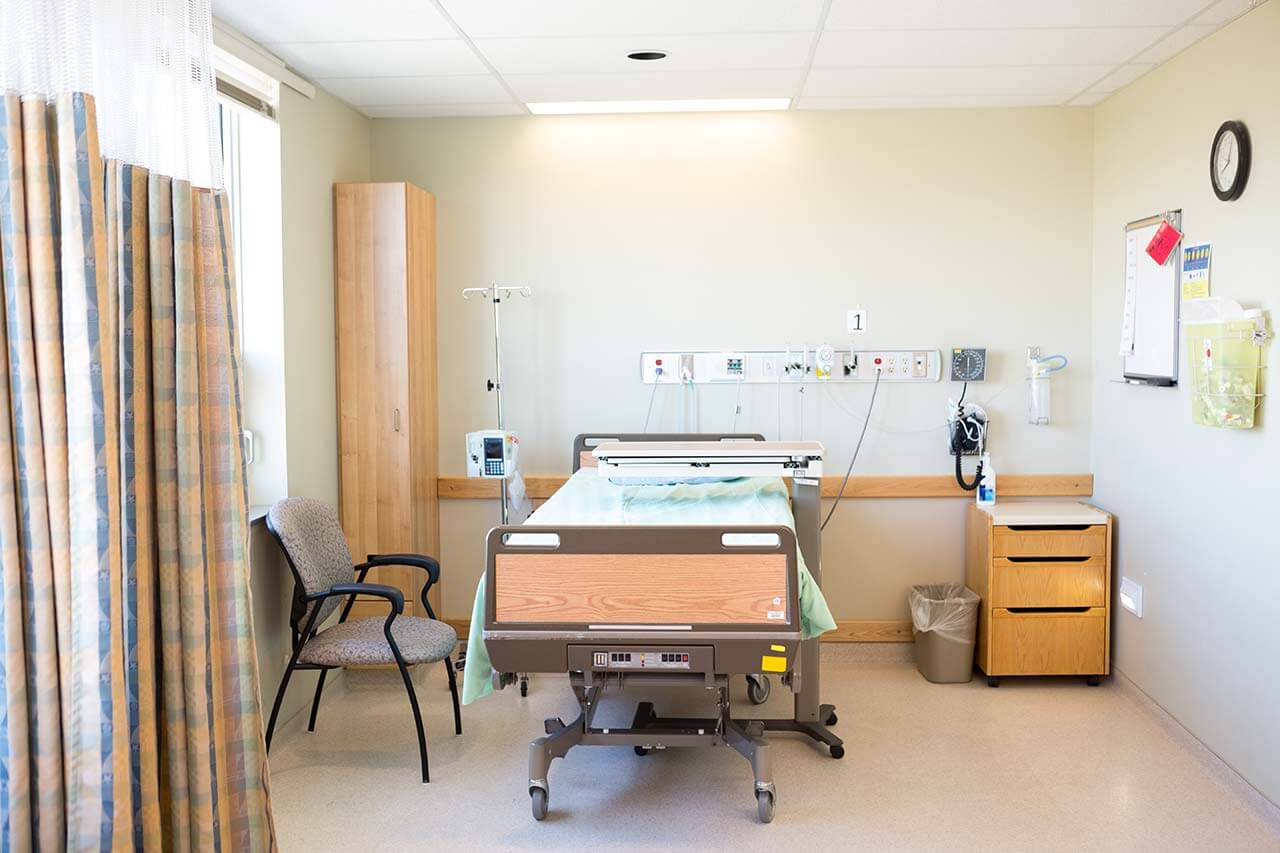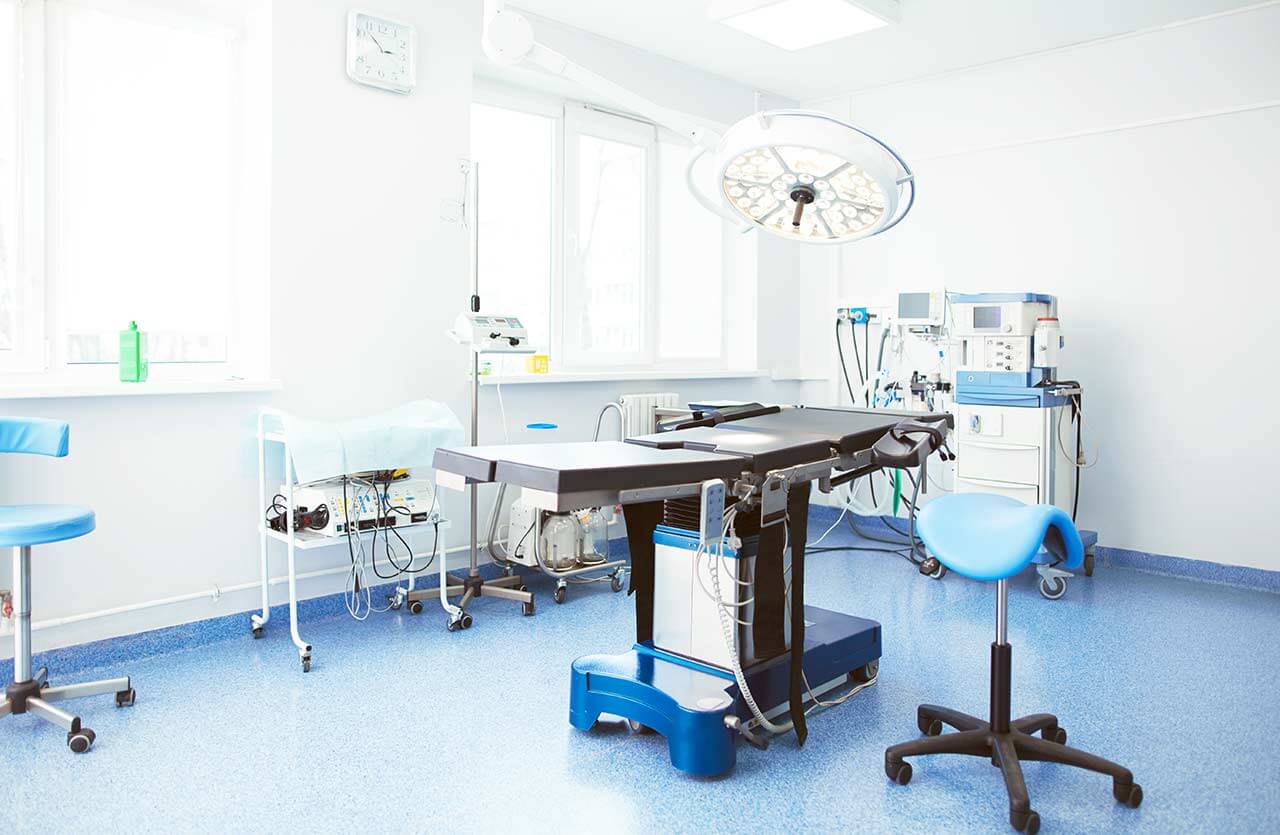
The program includes:
- Initial presentation in the clinic
- clinical history taking
- review of medical records
- physical examination
- laboratory tests:
- complete blood count
- biochemical analysis of blood
- inflammation indicators (CRP, ESR)
- indicators blood coagulation
- barium passage
- abdominal ultrasound
- gastroscopy with injection of drugs
- analysis of hp (helicobacter pylori)
- nursing services
- consultation of related specialists
- treatment by chief physician and all leading experts
- explanation of individual treatment plan
Required documents
- Medical records
- Esophagogastroduodenoscopy (EGD) (if available)
Service
You may also book:
 BookingHealth Price from:
BookingHealth Price from:
About the department
The Department of Gastroenterology at the Schlosspark Hospital Berlin provides the full range of diagnostic and therapeutic services to patients with gastrointestinal diseases. The main focus of the department's clinical activities is endoscopic therapeutic procedures. For this purpose, modern equipment and comfortable treatment rooms are available here. The department's team of doctors has the necessary resources to provide emergency care to patients with acute gastroenterological diseases. The department's specialists, in cooperation with surgeons, oncologists, radiologists, and radiation therapists, successfully diagnose and treat cancers. The department also admits patients with type 1 and type 2 diabetes mellitus. Most diagnostic and therapeutic procedures are performed on an outpatient basis, which is an important advantage for patients. The department's medical team consists of experienced doctors and nursing staff, for whom it is important that each patient receives effective treatment that meets his individual needs and wishes. The department is headed by Dr. med. Rebecca Tschöpe.
Many patients seek medical help from the department with suspected malignant gastrointestinal tumors, such as stomach, small and large intestinal, esophageal, biliary tract, and pancreatic neoplasms. Such patients are prescribed a complex of diagnostic examinations, including laboratory tests, hardware and imaging tests, and functional diagnostics. If the diagnostic results confirm the doctor’s fears about the oncological process in the patient’s body, the clinical case is considered at the weekly tumor board with the participation of gastroenterologists, oncologists, surgeons, radiation therapists, and radiologists. The task of the interdisciplinary board is to cooperatively assess the patient's clinical case and develop the optimal course of treatment for them, which will be effective but at the same time as sparing as possible. Tumor removal surgery is often required to achieve a successful outcome. If a malignant neoplasm is detected at an early stage, the department's gastroenterologists perform endoscopic tumor resection. A huge advantage of the endoscopic procedure is its low-traumatic rate because an approach to the pathological focus is provided through natural openings without any incisions, which accelerates the recovery process. In the advanced stages of cancer, the best option for removing the tumor is laparoscopic or open surgery.
The competence of the department's gastroenterologists includes palliative endoscopic procedures for stenotic digestive tumors (in inoperable patients). The treatment aims at relieving pain and restoring the ability to self-feed. During endoscopic stent implantation, a special guidewire is used with a folded stent attached to it. The guidewire is inserted through the oral cavity and, under imaging guidance, directed to the area of narrowing, where the stent is fixed and straightened, thereby restoring the patency of the digestive canal. As a rule, to provide the patient with maximum comfort, the stenting procedure is performed under sedation. In some cases, doctors may also use local anesthesia.
The department regularly performs endoscopic hemostasis procedures for gastrointestinal bleeding. Internal bleeding most often develops due to stomach and duodenal ulcers, gastritis, inflammatory bowel disease, diverticular disease, esophageal varices, stomach and bowel polyps, and gastrointestinal tumors. Gastrointestinal bleeding requires emergency medical attention. Otherwise, it may lead to irreversible consequences and even death. The department's gastroenterologists successfully cope with the treatment of internal bleeding using low-traumatic endoscopic techniques. Prior to the implantation, the specialists carry out examinations to accurately determine the source of bleeding. The gastroenterologist then inserts an endoscope (a thin tube with a video camera and functional attachments) through the oral cavity, directing it to the pathological focus under imaging guidance in real time. Depending on the type of bleeding and its abundance, the optimal type of hemostasis is used, which may be application or injection hemostasis, clipping, ligation, electrocoagulation, argon plasma coagulation, etc.
The department's range of medical services includes:
- Diagnostics
- Ultrasound scans
- Abdominal ultrasound scans (if necessary with contrast enhancement and puncture)
- Elastography for diagnosing gastrointestinal tumors
- Endoscopic examinations
- Gastroscopy
- Colonoscopy
- Capsule endoscopy and balloon-assisted enteroscopy for diagnosing colon
- Endosonography
- Functional diagnostics
- Breath tests for lactose and fructose intolerance
- Esophageal impedance and pH-metry for diagnosing gastroesophageal reflux disease
- High-resolution esophageal manometry for detecting esophageal dysfunction
- Ultrasound scans
- Treatment
- Drug therapy
- Endoscopic procedures
- Removal of benign and malignant tumors in the early stages
- Stent implantation for stenosis caused by benign and malignant gastrointestinal tumors
- Hemostasis for gastrointestinal bleeding
- Stomach and colon polyp removal (polypectomy)
- Percutaneous transhepatic biliary drainage
- Endoscopic retrograde cholangiopancreatography
- Endoscopic treatment for pseudocysts and necrectomy after pancreatitis
- Other diagnostic and treatment methods
Curriculum vitae
Since May 1, 2020, Dr. med. Rebecca Tschöpe has been heading the Department of Gastroenterology at the Schlosspark Hospital Berlin. The doctor also holds the position of Head Physician in the Department of Gastroenterology, Oncology, Pulmonology and Endocrinology at the Park-Clinic Weissensee Berlin. Of particular interest to Dr. med. Rebecca Tschöpe are endoscopic diagnostic and therapeutic procedures for gastrointestinal diseases.
Photo of the doctor: (c) Schlosspark-Klinik GmbH
About hospital
The Schlosspark Hospital Berlin began its work in 1970 and, during this time, has gained an excellent reputation not only in Germany but also in the international medical arena. The Schlosspark Hospital Berlin is an academic hospital of the Charite University Hospital Berlin, which is one of the best medical centers in Europe and throughout the world. The successful clinical practice of the medical facility is based on an advanced medical and technical base, access to the very latest and most effective treatment methods, and the exceptional competence and experience of medical personnel. The hospital is located in the picturesque Charlottenburg Park, away from the hustle and bustle of the city, which contributes to the peace of mind of patients.
The hospital's bed fund includes 340 beds. Structurally, the hospital consists of 12 specialized departments with narrowly focused centers integrated into them, which are responsible for the treatment of a particular group of diseases. More than 14,000 patients are treated annually at the hospital. One of the priorities of the medical facility is emergency medical care. With an annual number of more than 10,000 surgical interventions, including operations of high complexity, the department is particularly interested in surgical treatment.
The hospital's medical team consists of more than 900 employees. The departments at the hospital are headed by professors who are well-known in the medical community and have impressive clinical experience and outstanding professional achievements. In the course of diagnostics and treatment, an individual approach is used for each patient, and his needs and wishes are also taken into account. The hospital pays due attention to patient care during the therapeutic process. Despite state-of-the-art medical equipment and the automation of many processes, a humane and respectful attitude towards the patient is the first priority for the doctors at the hospital. The specialists are always open to dialogue and do their best to achieve the best treatment outcomes.
Photo: (с) depositphotos
Accommodation in hospital
Patients rooms
The patients of the Schlosspark Hospital Berlin live in comfortable rooms with light colors. Each patient room has an ensuite bathroom with a shower and a toilet. The standard patient room includes a comfortable automatically adjustable bed, a bedside cabinet with a pull-out table, a wardrobe, a table and chairs for receiving visitors, a telephone, and a TV. Wi-Fi is available on the territory of the hospital. The hospital also offers enhanced-comfort rooms with a more exquisite design.
Meals and Menus
The patient and their accompanying person are offered three meals a day: breakfast, lunch, and dinner. A new menu is prepared for patients each week. Only high-quality and fresh products are used for cooking meals. The menu includes dietary and vegetarian dishes. The patient will be offered an individual menu if necessary.
There is a cozy cafe on the ground floor of the hospital that serves full breakfasts, a wide range of hot and cold drinks, delicious desserts, and snacks.
Further details
Standard rooms include:
Accompanying person
The accompanying person may stay with you in the patient room or at the hotel of your choice during the inpatient program.
Hotel
You may stay at the hotel of your choice during the outpatient program. Our manager will help you choose the best option.




